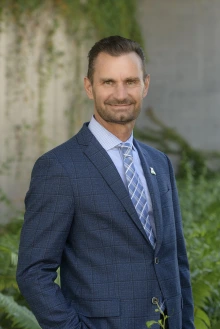Dr. Todd Vanderah appointed Regents Professor
Todd Vanderah, PhD, has been appointed as a Regents Professor, a title awarded to full professors who have garnered the most distinguished accomplishments in research, teaching, scholarship or creative work. Dr. Vanderah is a department head and professor of the University of Arizona College of Medicine – Tucson’s Department of Pharmacology and director of the UArizona Health Sciences Comprehensive Pain and Addiction Center.

Todd Vanderah, PhD
“As a double graduate of the University of Arizona, my heart and soul live at this institution,” said Dr. Vanderah. “Appointment as a Regents Professor is the highest honor that a professor can achieve and reflects the privilege I have had to serve all of my colleagues at the UArizona, listening to all constituents and acting on their concerns, needs and dreams for the university’s future.”
“He is a leader building programs and solutions for the people of Arizona,” said UArizona Health Sciences Senior Vice President Michael D. Dake, MD. “Dr. Vanderah recognized the feedback loop chronic pain and substance abuse can create and is seeking out creative solutions to ease patients’ suffering.”
“All of us at the College of Medicine – Tucson are incredibly proud of Dr. Vanderah and his many years of important accomplishments and contributions, including advancing the science of pain management and addiction, expanding the college’s undergraduate education mission with the innovative and very popular Bachelor of Science in Medicine program, and leading the Department of Pharmacology, among others. He is truly deserving of this honor,” said College of Medicine – Tucson Dean Michael M. I. Abecassis, MD, MBA.
Dr. Vanderah said he is grateful to UArizona Health Sciences for supporting his career and research pursuits by providing the encouragement and resources to follow his dreams of helping those who suffer from chronic pain and substance use disorders/addiction.
“UArizona Health Sciences has provided the support to start a Comprehensive Pain and Addiction Center that allowed for over 50 of our talented faculty and staff to help with solving issues with the opioid epidemic and chronic pain. They have allowed me to build the university’s first paraprofessional training program to help families and individuals in our communities with substance use disorder while decreasing stigma around individuals that suffer from opioid use and substance use disorders. They have also helped me establish a partnership with other universities, including Oklahoma State University, in a goal to bring new treatments to the FDA in five years for opioid use disorder, preventing fentanyl overdoses and novel, non-addictive medications for helping those who suffer from chronic pain,” he said.
He was also instrumental in the development of the Bachelor of Medicine degree, working across the UArizona campus in creating a comprehensive new degree program. He said he counts this as one of his two greatest career accomplishments. “This has been a goal of mine since graduating with my Bachelor of Science degree from the UArizona.”
The other accomplishment he said he was most proud of was establishing alternative treatments for metastatic bone cancer pain. “I have spent the last 15 years working on how to help metastatic cancer patients overcome the devastating pain that ensues when cancer invades the bone microenvironment. This includes the discovery of how non-psychotropic cannabinoids play a role in inhibiting the inflammatory environment, reducing the activation of the pain pathways of the nervous system and their role in significantly decreasing cancer-induced bone loss. To see the research that my lab has done for many years result in significant clinical outcomes for patients that suffer from cancer pain without the risks of substance use disorder is by far one of my greatest career accomplishments.”

